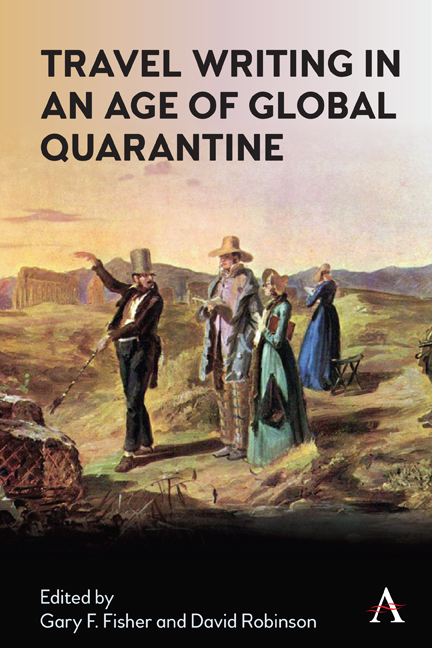Book contents
- Frontmatter
- Contents
- Foreword
- Acknowledgements
- Introduction
- Chapter One ‘Off-Stage, A War’: Wuhan, 1938
- Chapter Two Frederic Lees in Varese Ligure, 1911
- Chapter Three ‘A Rude People Subjected to No Restraint’: In Tanimbar with Anna Keith Forbes, Henry Forbes and So’u Melatunan
- Chapter Four Sent to Coventry: A Journey Home?
- Chapter Five Bedouin Is a Place: Freya Stark’s Travel with Nomads
- Chapter Six With Wilkie in the West: Reading Wilkie Collins’s Rambles beyond Railways from a Cornish Perspective
- Chapter Seven Picturing Rome: Walking the Eternal City with the Last Victorian
- Chapter Eight Su e zo per i ponti; or, How History Does Not Help
- Chapter Nine A Town Called Entropy: Boom and Bust in Arnold Bennett’s Potteries
- Chapter Ten Travelling towards Transculturalism? Statues, Remembrance and Mourning in Bloemfontein, South Africa
- Chapter Eleven Recollections of the King’s House
- Chapter Twelve Occupying Her Time: Ginette Eboué, France, 1940–42
- Epilogue
- List of Contributors
- Works Cited
Chapter Five - Bedouin Is a Place: Freya Stark’s Travel with Nomads
Published online by Cambridge University Press: 18 November 2021
- Frontmatter
- Contents
- Foreword
- Acknowledgements
- Introduction
- Chapter One ‘Off-Stage, A War’: Wuhan, 1938
- Chapter Two Frederic Lees in Varese Ligure, 1911
- Chapter Three ‘A Rude People Subjected to No Restraint’: In Tanimbar with Anna Keith Forbes, Henry Forbes and So’u Melatunan
- Chapter Four Sent to Coventry: A Journey Home?
- Chapter Five Bedouin Is a Place: Freya Stark’s Travel with Nomads
- Chapter Six With Wilkie in the West: Reading Wilkie Collins’s Rambles beyond Railways from a Cornish Perspective
- Chapter Seven Picturing Rome: Walking the Eternal City with the Last Victorian
- Chapter Eight Su e zo per i ponti; or, How History Does Not Help
- Chapter Nine A Town Called Entropy: Boom and Bust in Arnold Bennett’s Potteries
- Chapter Ten Travelling towards Transculturalism? Statues, Remembrance and Mourning in Bloemfontein, South Africa
- Chapter Eleven Recollections of the King’s House
- Chapter Twelve Occupying Her Time: Ginette Eboué, France, 1940–42
- Epilogue
- List of Contributors
- Works Cited
Summary
If life gets tight, loosen it by travel.
In 2020, with the opportunities for any form of travel to local areas and micro-adventures reduced by the onslaught of Covid-19, it feels as if vicarious travel has taken on a greater urgency. With many people isolated for months of the year and unable to connect and socialise, experiencing travel as a solo activity has perhaps felt abnormal for many readers. However, there are those of us who have always valued that peculiarly effervescent glow that comes from exploring the world on our own. As Freya Stark wrote of her first morning in Baghdad, Iraq, in October 1929: ‘To awaken quite alone in a strange town is one of the pleasantest sensations in the world. You are surrounded by adventure.’ To feel immersed in the unfamiliar with a yearning to know and learn is what took me in 2011 to Nuweiba’, South Sinai, Egypt, to discover more about the Tarrabin Bedouin tribe and a traditional dance called Dahiyya. After many years of ‘downward exploration’ in small communities across the world – and occasionally cities – I had recognised not only the thrill of travelling alone but also how it enabled me to connect and communicate with local people in a slow, quiet way. Travelling alone, especially as a woman, is not a brave decision as many continue to insist but, in my opinion, can be a necessary one. Admittedly, there is a deep personal satisfaction to completing solo journeys, but that is far outweighed by the mesh of encounters created by entering an unknown environment armed with only our individual tool kit of language, empathy and experience, and with no recourse other than to choose to be vulnerable and put our faith in those around us.
Freya Stark was an individual who, with little money and few connections, forged an impressive career as an ethnographer, traveller and writer, driven by a deep-rooted belief that travel creates understanding across cultures. She believed that this subtle understanding is essential for compassion towards and consideration of others and should comfort and guide all travellers. Many of her later employments revolved around improving relations between cultures or groups. In 1979, the year that I was born, Stark, at age 86, was climbing mountains in Nepal with a BBC film crew.
- Type
- Chapter
- Information
- Travel Writing in an Age of Global Quarantine , pp. 65 - 80Publisher: Anthem PressPrint publication year: 2021

